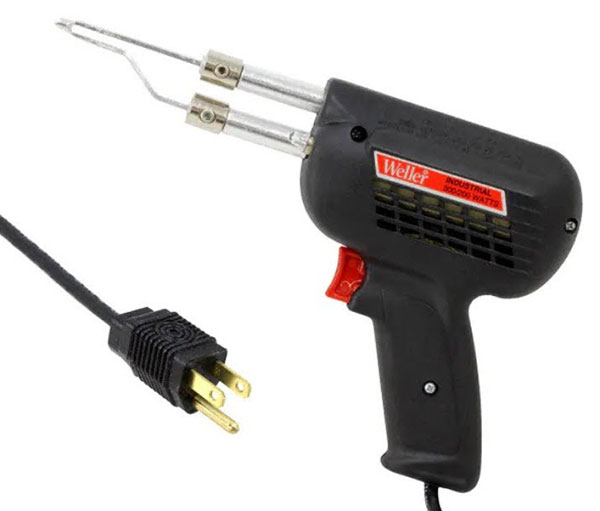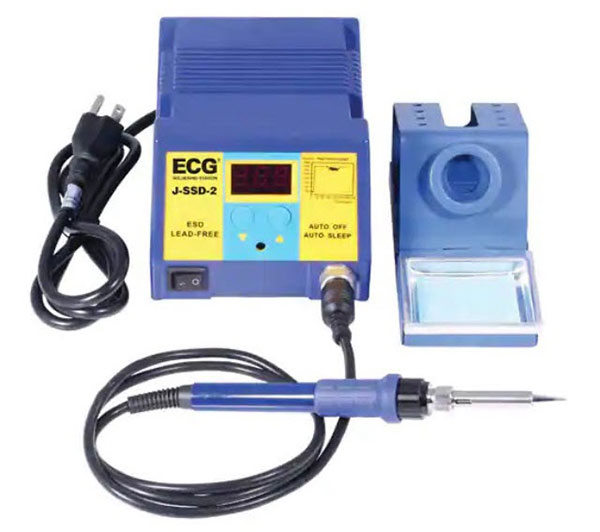制造商零件编号 D650PK
SOLDERING GUN 200W 300W 120V
Apex Tool Group
When you’re just starting to work on DIY electronics projects, you might wonder how to choose the correct tools to assemble custom PCBs. We covered some of these basics in our last blog in this series, and for this article, we’ll talk about a particularly important detail: what soldering iron to use?
The large variety of different types, makes, and models of soldering irons can be overwhelming for beginners. But is it necessary to buy a high-powered and expensive soldering iron if you’re a beginner? This article gives you an introduction to soldering irons and how to choose one that works well for you.
There’s no such thing as a universally perfect tool for soldering. What works well for one person might be unsuitable for others, and the suggestions in this article refer to my personal preference and experience. It might take awhile before you find a solution that works well for you. There are generally four types of soldering tools that are relevant for hobbyists and makers.
The simple classic soldering iron comes shaped like a pen with a cable attached to it. The tip heats up while the body remains cool enough to hold. These devices are typically cheap, reliable, and easy to use. However, they rarely offer any temperature control. They heat to a predetermined temperature and then self-regulate. Many such devices allow you to swap out the heated tip for different applications. This is often a preferred tool for soldering since it’s very versatile and easy to carry around.
Suggested products:
Soldering guns are another type of tool for soldering. However, I can’t recommend using them for electronics if you’re a beginner, as these tools usually heat quickly and aggressively, and you can easily destroy smaller components if you heat them for too long. Usually, these tools are used for cutting different materials and in woodworking. However, you can use them to solder electronics, and they certainly have their applications. As mentioned, they heat quickly and are typically also very powerful. These properties make soldering guns a fantastic choice for soldering large joints and heatsinks, for example.

Soldering stations are a more advanced version of simple soldering irons, as they offer a few additional features. Most notably, you can specify a target temperature, which enables you to work with many types of electronic components. If you have a workbench that allows you to set up a soldering station, I recommend you buy one, especially if you plan to solder more often. You should, however, invest in a decent one, as the more expensive devices are of better quality. Keep in mind that you aren't supposed to carry soldering stations around a lot, so the soldering iron might come with a shorter cable, which might make it more difficult to maneuver around a tight workbench.

A typical soldering station that offers more features than a simple soldering pen. Source: SOLDER STATION 75W
Recommended products:
Hot air systems and rework stations are mainly intended for professional use and to repair PCBs. I can’t recommend that you use these systems as a beginner, not only because they’re typically more costly than a good quality soldering iron or soldering station. Besides that, these systems can be rather complicated to work with if you’re a beginner. Hot air stations, however, are great for working with SMD parts.
As we’ve seen so far, various soldering tools have different uses, strengths, and weaknesses. So, before you look into buying one, evaluate your situation and how you plan to use your new tool.
Next, you’ll have to consider the tool’s power rating. I use a 25 Watt soldering iron, which is suitable for a wide range of soldering jobs. However, it might be a bit too powerful for beginners, and I’d recommend that you buy a 15 Watt to 20 Watt model at first and see how that works for you.
Regardless of the wattage, you’ll want to buy a soldering iron that can reach temperatures between 300 degrees and 400 degrees Celsius (570 degrees to 750 degrees Fahrenheit). The temperature setting is where soldering stations are ahead of the cheaper competition, as you can easily vary the temperature for different applications and jobs.
This section mainly applies to the simple soldering irons and guns. Some of them come with accessories included in the package. However, some more cost-effective options might require you to get some additional extras that make it easier to work with the device. I recommend investing in a proper metal stand that also offers a space for a small cleaning sponge. You can also get a more sophisticated cleaning accessory that uses brass wool to clean the soldering iron tip.

Make sure to invest in a good quality stand when you opt for a soldering pen. Good soldering iron holders are sturdy and offer a space for a cleaning sponge or brass wool. Source: SOLDER STATION 58W 1 CH 110-130V
Recommended products:
Choosing a soldering iron is a very personal thing. There’s no one-size-fits-all solution that’ll work in every application and for every user. You’ll most likely have to try a few different ones before you find one that works well for you. This article has covered some good rules of thumb: ensure that the tool has an exchangeable tip and doesn’t go too high on the power rating. Usually, 15 Watts to 25 Watts is sufficient for beginners and hobbyists when working with electronic components. You should also invest in a good quality stand and cleaning supplies if your soldering tool doesn’t include them in the package.